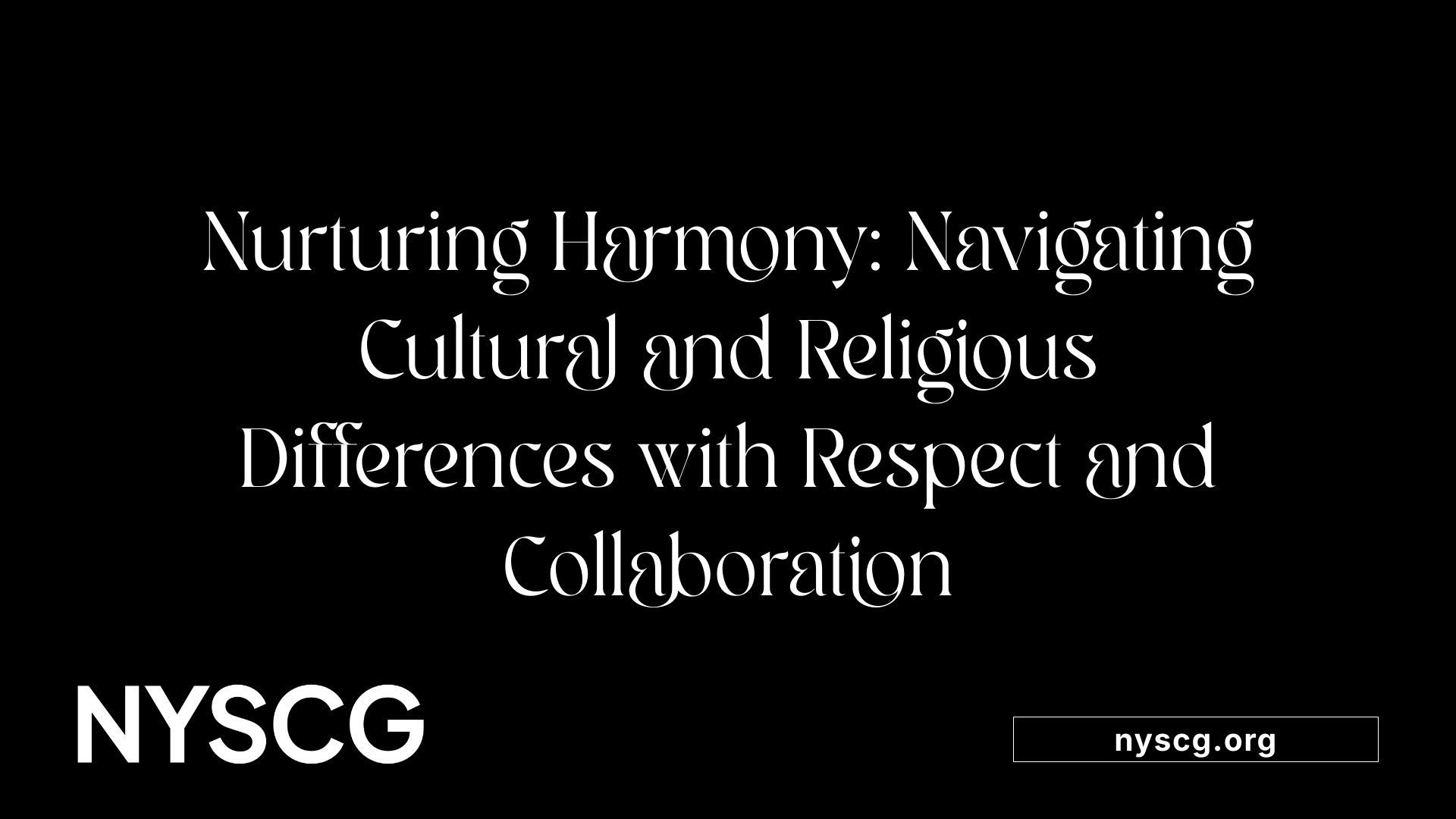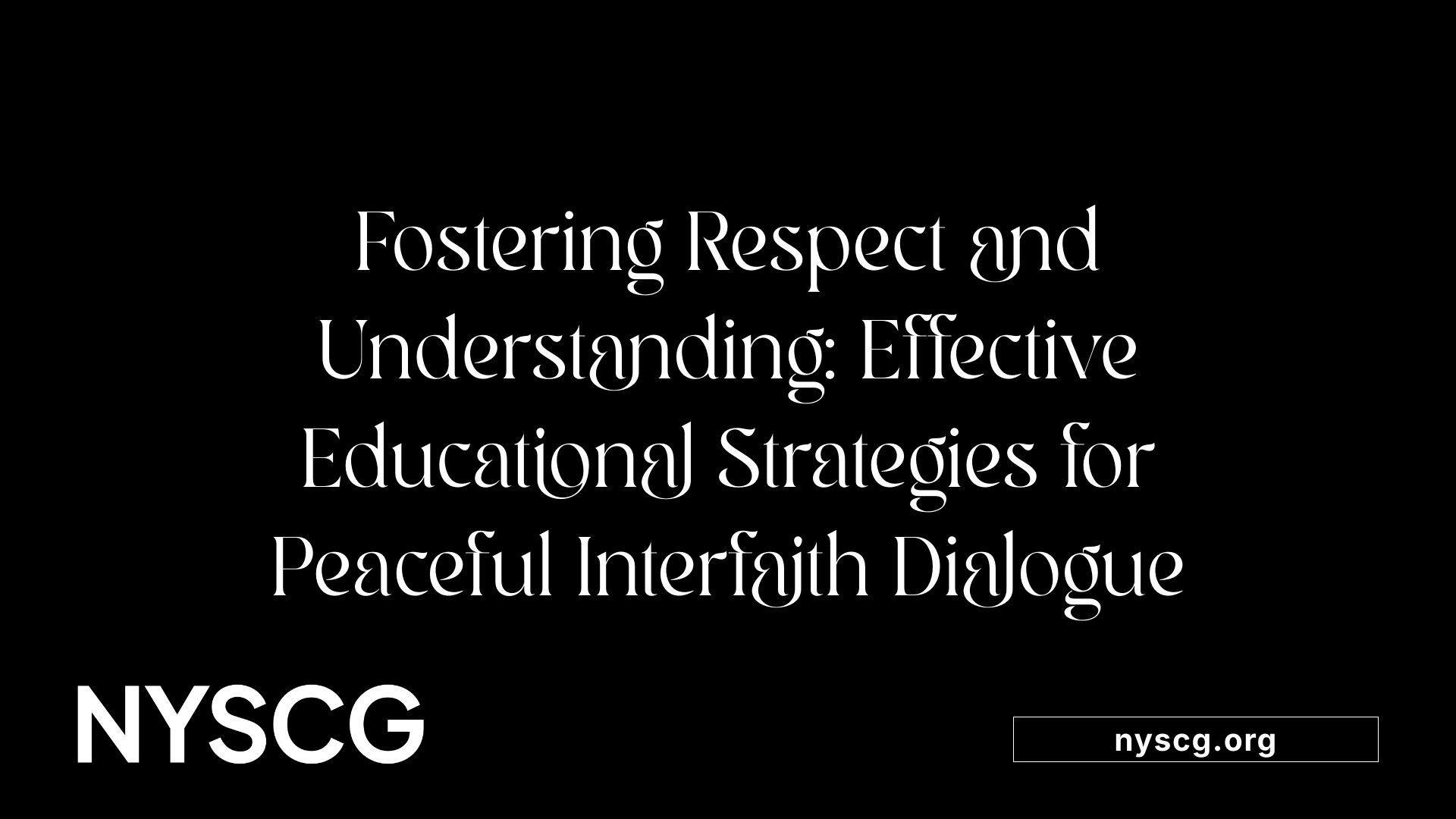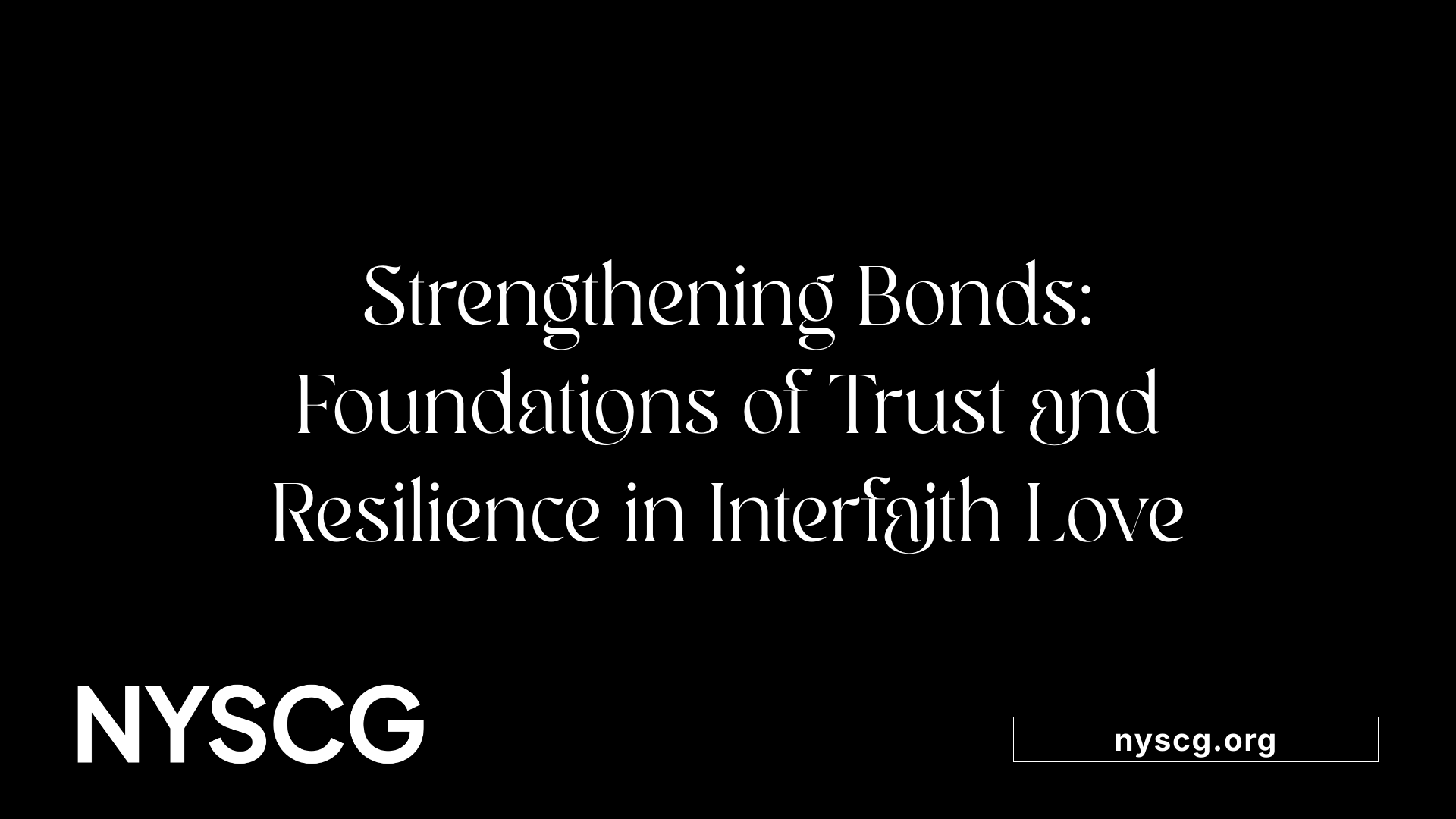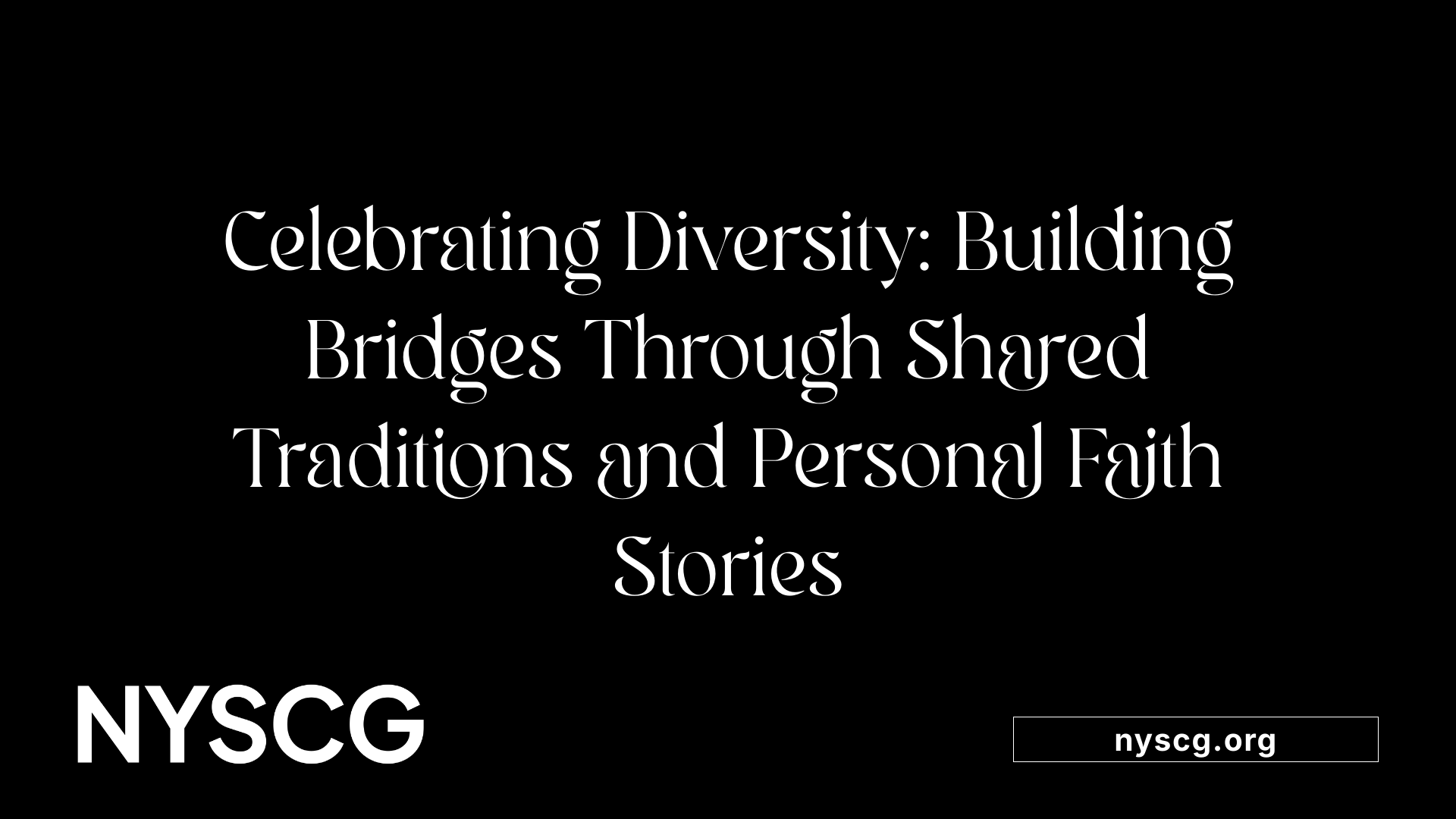Navigating Interfaith Differences in High-Stakes Settings


In an increasingly diverse world, navigating interfaith differences—especially in high-stakes settings—demands nuanced understanding, strategic communication, and genuine relationship-building. From personal relationships to community initiatives, the importance of fostering unity across religious divides has never been more critical. This article explores research-backed insights, practical approaches, and effective strategies that enable respectful dialogue, mutual understanding, and enduring cooperation in sensitive contexts.
Research indicates that fostering harmony between different faiths benefits greatly from respectful dialogue, community involvement, and shared projects. These efforts build mutual respect, reduce misunderstandings, and create bonds rooted in common human values.
The lives of figures like Jesus and the Apostle Paul serve as powerful examples. Both practiced engaging with diverse groups through sincere concern, careful listening, and sensitivity to cultural differences. They emphasized respect for various beliefs while remaining true to their own traditions.
An effective strategy involves identifying shared principles such as love, compassion, and dignity. Highlighting these commonalities offers a practical foundation for cooperation and understanding.
When initiating interfaith discussions, starting with mutual values rather than doctrinal differences helps create a welcoming environment. Respecting each tradition’s particularity and fostering genuine relationships contribute to trust and decreased tension.
Engagement through shared initiatives—such as community service or joint celebrations of universal virtues—further enhances understanding. These activities promote direct encounters, making abstract concepts of faith tangible and relatable.
In summary, biblical models of engaging others, combined with a focus on shared values and active relationship-building, are effective methods for cultivating interfaith unity. Respectful dialogue, community involvement, and a genuine openness to learning from one another help overcome barriers and nurture peaceful coexistence.

Different couples navigate their cultural and religious differences through various approaches. Some adopt an assimilation pattern, blending into one dominant culture and adopting its practices. Others develop a bi-cultural strategy, maintaining distinct traditions from each side but sharing them within the family. The modified bi-cultural approach involves adjusting traditions to suit their unique relationship, while secular couples may focus less on religious practices.
The transcendent pattern emphasizes creating a new, shared cultural identity that transcends individual traditions. Understanding these patterns helps couples choose the best ways to integrate their beliefs and practices.
Successful management of interfaith and intercultural relationships requires ongoing, honest dialogue. Couples benefit from making joint decisions about important matters like wedding ceremonies, holiday observances, and raising children. Collaborative planning encourages mutual respect and helps avoid misunderstandings. It also involves setting boundaries with extended family, especially when traditional expectations around religious upbringing and ceremonies arise.
Community involvement can provide additional support. Engagement with faith communities or counseling experts fosters understanding and shared values. Building trust through shared decision-making creates a strong foundation for long-term relationships.
Deciding how to raise children in interfaith families is often complex. Options range from exclusive religious upbringing aligned with one parent’s faith to integrated, blended approaches that incorporate multiple traditions. Couples can also establish new, family-specific rituals to honor both backgrounds.
Open discussions about holiday celebrations, religious teachings, and spiritual exposure are essential. Addressing disagreements patiently, respecting each tradition’s particularities, and finding common ground can turn potential conflicts into opportunities for growth.
Many couples find that sharing their beliefs and explaining their significance deepens mutual understanding. Sometimes, counseling or guided conversations help clarify values, ensuring children experience a respectful and inclusive spiritual environment.
Managing religious differences can pose various challenges, such as misunderstandings, stereotypes, and external pressures from extended family or community expectations. These issues may also include dilemmas about religious education, holiday participation, and cultural customs.
Effective strategies include engaging in open, respectful dialogue and practicing active listening. Sharing personal stories and experiences helps build empathy and dispel stereotypes. Establishing clear boundaries and expectations ensures that both partners feel heard and respected.
Creating inclusive environments, where each tradition is celebrated and appreciated, fosters harmony. Couples might find value in understanding core values like kindness, respect, and love that underpin religious differences.
Gradually, these approaches build mutual trust, allowing the relationship to grow resilient despite external pressures. Embracing differences with patience and love ultimately strengthens interfaith partnerships, making them enriching and enduring.

Effective strategies for teaching interfaith engagement, particularly in delicate or conflict-prone settings, rely on experiential learning and dialogue-centered pedagogies. These methods facilitate open conversations, active listening, and mutual respect, helping participants better understand different religious and cultural perspectives.
Incorporating diverse religious and cultural perspectives into curricula is also essential. This can include lessons on various faith traditions, celebrations of cultural holidays, and discussions on social issues through different worldviews. Such content helps challenge stereotypes, reduce prejudice, and foster tolerance.
Creating environments where individuals feel safe to share personal faith experiences is crucial. Safe spaces encourage honest dialogue, vulnerability, and genuine understanding. Activities like community projects or reflective exercises allow participants to connect on a human level beyond doctrinal differences.
Curriculum design should involve educators and community representatives to ensure content is relevant, respectful, and sensitive to local tensions. This cooperative approach helps avoid misunderstandings and promotes authenticity.
The overall goals are to enhance religious literacy, promote ethical reflection, and build shared civic values. These efforts strengthen social cohesion, reduce conflicts, and nurture respectful relationships across faith communities.
| Approach | Description | Benefits |
|---|---|---|
| Experiential Learning | Hands-on activities, role-playing, immersions, community service | Builds empathy, reduces bias, deepens understanding |
| Dialogue-Based Pedagogies | Facilitated discussions, reflection circles | Promotes active listening, respect, and mutual trust |
| Inclusive Curriculum Content | Teaching about multiple traditions, cultural practices | Challenges stereotypes, broadens perspectives |
| Safe Sharing Environments | Creating trust through structured sharing of personal stories | Fosters openness, vulnerability, connection |
| Community and Teacher Collaboration | Designing context-specific content with local input | Ensures appropriateness, respects sensitivities |
Search terms like "interfaith education," "instructional strategies," and "sensitive curriculum development" reflect these approaches, emphasizing their importance for peaceful and respectful intercultural engagement.

Having a solid foundation of trust, open communication, and mutual respect before facing challenging situations helps interfaith couples navigate conflicts more effectively. When relationships are built on understanding and shared values early on, couples are better equipped to handle unexpected issues that arise from cultural or religious differences.
Unexpected challenges—such as disagreements over religious practices, family pressures, or community reactions—are common in interfaith relationships. Approaching these situations with patience and a willingness to listen fosters an environment of safety and respect. Often, these issues become less intimidating when couples analyze them calmly, seek to understand each other's perspectives, and avoid reactive responses.
Deepening trust involves vulnerability—sharing fears, doubts, and beliefs—without fear of judgment. When couples are open about their values and struggles, they reinforce their connection. Respecting each other's traditions and identities creates a resilient partnership capable of withstanding external pressures and internal conflicts.
In high-stakes or emotionally charged situations, effective communication is vital. Couples should focus on:
Seeking neutral mediators or couples’ counselors trained in interfaith matters can provide additional support. Building these skills beforehand makes managing future crises more manageable.
| Strategy | Description | Benefits |
|---|---|---|
| Open, honest dialogue | Encourages sharing feelings and beliefs clearly | Builds trust and understanding |
| Respecting traditions | Honors each other's religious backgrounds | Reduces tensions and misunderstandings |
| Mediation and counseling | Uses neutral facilitators for conflict resolution | Provides objective guidance |
| Finding common ground | Focuses on shared values and goals | Strengthens partnership |
| Prioritizing relationship health | Addresses issues early before escalation | Promotes resilience and long-term success |
Deepening understanding of each other's faith traditions—including their biblical and theological interpretations—helps families appreciate diverse perspectives. This knowledge fosters empathy and reduces misinterpretations, allowing couples to navigate differences with confidence and respect, especially during crises.
Maintaining continuous dialogue about faith, customs, and family plans prevents misunderstandings. Regularly addressing questions and concerns nurtures trust and demonstrates mutual commitment. When couples invest in understanding and respecting each other’s spiritual lives, they build resilience to face challenges together.

Interfaith couples often find joy and enrichment in celebrating a variety of religious traditions and holidays. This practice not only honors each partner's heritage but also fosters inclusivity and mutual appreciation. By blending traditions and creating new rituals, couples can build unique family customs that reflect their shared values. For example, families might combine elements from each faith during festivals or establish individual holiday observances that accommodate both partners' beliefs.
Hosting diverse celebrations allows children to grow up with a broad spiritual perspective, nurturing respect for different practices. Celebrating multiple traditions becomes a source of bonding and a way to demonstrate love, acceptance, and openness.
A powerful way for interfaith couples to strengthen their relationship is through sharing personal faith stories. These narratives reveal individual spiritual journeys, highlighting what each belief system signifies on a personal level. Listening actively and empathetically helps partners understand each other's values and experiences.
Exploring stories from religious texts or personal histories fosters deeper respect and appreciation. It can also spark meaningful conversations, challenge assumptions, and inspire mutual growth. When couples openly discuss their faith stories, they build trust and strengthen their emotional connection.
Recognizing and valuing differences is fundamental in interfaith relationships. Embracing diverse beliefs can lead to greater acceptance, tolerance, and self-awareness. Couples who focus on common values—such as love, compassion, and respect—find common ground amidst their differences.
This approach encourages collaboration rather than conflict, promoting an environment where both partners feel respected and understood. Over time, embracing diversity helps in developing resilience and adaptability, enriching the relationship experience. Mutual respect, along with open dialogue, turns challenges into opportunities for learning and personal growth.
| Aspect | Approach | Benefits | Examples |
|---|---|---|---|
| Celebrating traditions | Blending rituals, creating new family practices | Enriches family life, teaches respect | Combining holiday rituals, establishing joint celebrations |
| Sharing faith experiences | Telling personal stories, discussing beliefs | Builds empathy, deepens understanding | Sharing religious stories, personal faith journeys |
| Embracing differences | Valuing diversity, focusing on common values | Fosters respect, promotes resilience | Mutual respect exercises, collaborative decision-making |

Deepening one's knowledge of their own biblical and theological roots is essential in fostering respectful and meaningful interfaith connections. When individuals explore how their faith interprets love, justice, and community, they develop a clearer sense of their unique identity. This clarity leads to greater confidence in dialogue, allowing for honest sharing without fear of losing one's core beliefs.
Understanding one's tradition also opens pathways to appreciate others' spiritual perspectives. Recognizing the biblical narratives or theological principles that underpin different faiths helps bridge gaps, fostering mutual respect and shared values. This process often results in richer, more compassionate relationships that honor each tradition’s particularity.
Reconciling differences requires both humility and a willingness to listen deeply. It involves acknowledging the diversity of biblical interpretations and doctrinal teachings across faiths. Engaging with these differences through respectful dialogue encourages understanding rather than confrontation.
Practicing good listening, respecting each tradition's particularity, and keeping an open mind help diminish misunderstandings. Sometimes, focusing on shared ethical principles like compassion or justice helps create common ground. Additionally, considering theological reflections from scholars and spiritual leaders can illuminate how different traditions can complement each other in pursuit of shared human values.
Through ongoing biblical and theological reflection, interfaith participants learn to honor differences while building bonds rooted in love, respect, and understanding.
| Aspect | Focus | Benefits |
|---|---|---|
| Deepening Faith | Personal exploration of one's biblical and theological roots | Builds confidence, clarifies identity |
| Respecting Others | Appreciating doctrinal diversity | Fosters mutual respect |
| Reconciliation | Navigating doctrinal differences | Promotes peaceful understanding |
| Shared Values | Finding common ground | Enhances collaboration and community |
This ongoing process enriches relationships, supports community-building, and aligns faith-based engagements with biblical principles of love and respect.
Building bridges across religious divides in high-stakes settings is an ongoing, intentional process that requires patience, mutual respect, and proactive engagement. By fostering open dialogue, respecting differences, and emphasizing shared values, communities and individuals can transform potential conflicts into opportunities for learning and unity. Leveraging biblical models, educational strategies, and proven communication techniques, stakeholders can create resilient relationships rooted in love and understanding. As societies become more diverse, commitment to active, empathetic engagement remains essential for a peaceful and cohesive shared future.
All you need is the will to make the world a better place.
New York State chaplain group inc. is a tax deductible organization with a federal tax Id number 92-383-4921